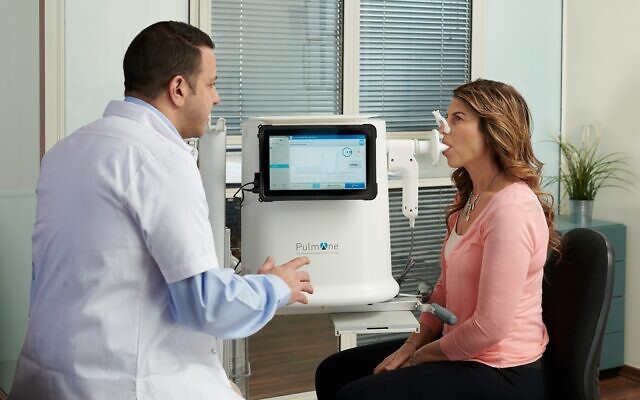Portable lung tests help patients breathe easier
Israeli startup PulmOne doubles its revenue by bringing hospital-quality pulmonary exams to doctors’ offices

More than half a billion people around the world suffer from lung disease. Until now, one of the only ways to diagnose the problem was a long series of breathing tests conducted inside a hermetically sealed, phonebooth-sized box managed by specialist personnel.
MiniBox+, created by PulmOne, an Israeli startup, allows pulmonary tests to be performed in clinics everywhere, driving down costs and speeding up diagnosis of dangerous lung diseases. It is a revolutionary lung function device about the size of a desktop computer, suitable for any table or mobile cart.
The old “body box” test used for decades tracks the gases in a large booth to measure how well the patient is breathing during the various exercises. The enormous cabinet-sized device requires highly trained staff to ensure proper gas ratios and that there are no leaks or issues with the large equipment.
PulmOne’s MiniBox+, which has already been granted FDA clearance, replaces the bulky old equipment using patented algorithms, machine-based learning, and an internal gasless measurement system. Doctors can now offer the test in small, local offices instead of requiring patients to travel to hospitals or major clinics. The PulmOne system brings swift diagnosis of common pulmonary diseases like asthma, emphysema, cystic fibrosis, and chronic obstructive pulmonary disease much closer to home.
PulmOne signed key agreements with a top US healthcare company and a leading medical technology distributor in China in the past year and saw its revenues more than double from 2020 to 2021 as it continues to tap into the growing pulmonary testing market, which is projected to reach over $1 billion in the years to come.
“This is potentially disruptive technology that will take the sleepy world of pulmonary technology, turn it on its head and make it a truly better, cheaper, faster system,” says Michael Berman, one of the early investors in PulmOne, and an expert in medical devices who has co-founded eight medical device startups and invested in many others.
“Most of the body boxes are in hospitals or pulmonology clinics where there’s a high flow of patients and they’ll get used a lot,” Berman says. Smaller doctors’ offices cannot dedicate an entire room to a single test, meaning patients are often referred to hospitals and clinics in major cities.
But during the pandemic, many medical facilities were forced to close to non-emergency procedures, leaving patients waiting for months to complete these vital tests. The challenge with lung diseases is that all of them present similar symptoms: difficulty breathing. Treatment varies widely depending on the cause, and only the full lung function test can provide doctors with an accurate diagnosis. These can be difficult to obtain, especially for patients living far away from major cities.
“I’ve used this device clinically and I’ve seen it tested in some of the largest academic centers,” says Dr. Jonathan Wiesen, a pulmonary specialist at Ben-Gurion University’s Soroka Medical Center who has seen the MiniBox+ in action. “All of the clinicians who have used it have been impressed by the ease of use, the speed at which it can measure lung volumes, and the ability patients have to tolerate it as compared to other measures of lung volume.”
“The body box, historically, has been very difficult to maintain, calibrate and evaluate,” Wiesen says. The MiniBox+ does not require expensive gases nor calibration, making it much more user-friendly. “Since it is very simple and easy to use, it can be used in many more circumstances, allowing many more patients to have access to pulmonary function tests.”
At around $35,000, the MiniBox+, which was completely developed in Israel and is fully compliant with American Thoracic Society and European Respiratory Society standards, costs around $15,000 less than the average body box, and, most importantly, does not require dedicated space.
About 70 percent of the MiniBox+ purchases so far are by smaller doctor’s offices and clinics that had never offered these tests before. Other buyers are using it to replace old body boxes. The company has sold almost 1,000 devices since they went on the market in 2016.
PulmOne is currently raising on the OurCrowd platform. For more details, click HERE.
